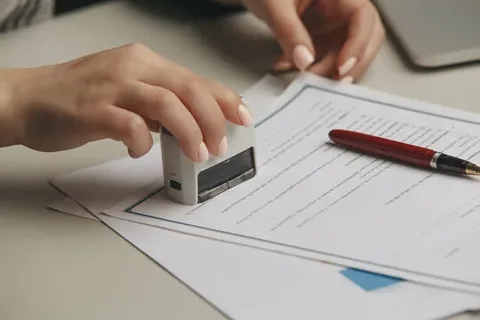In the world of legal transactions, accuracy and authenticity are paramount. One critical process that ensures the validity of many important documents is acknowledgment statement notarization. This notarial act verifies that a signer has willingly executed a document, understands its contents, and is indeed the person they claim to be. From property deeds to business agreements, this process plays a significant role in safeguarding legal integrity.
With the help of professional services, such as Dallas Best Mobile Notary Services, individuals and businesses can ensure that their notarization process is completed efficiently and in compliance with all applicable laws. Whether you are signing real estate documents, power of attorney forms, or loan agreements, understanding the acknowledgment process can save you time, money, and potential legal complications.
This guide will walk you through what acknowledgment statement notarization entails, why it’s important, and how to ensure it is done correctly.
What is Acknowledgment Statement Notarization?
Acknowledgment statement notarization is the process where a notary public verifies that a signer appeared before them, confirmed their identity, and acknowledged signing a document willingly. Unlike other types of notarizations—such as a jurat, which requires an oath—acknowledgments do not require the signer to swear under penalty of perjury.
In this procedure, the notary ensures:
- The signer personally appeared before them.
- The signer was positively identified using valid identification.
- The signer declared that the signature on the document is theirs and was made voluntarily.
This is particularly important for documents that will be used in courts, real estate transactions, and official government filings.
Why Acknowledgment Statement Notarization is Important
There are several reasons why acknowledgment statement notarization is not just recommended, but in many cases legally required:
- Legal Validation – It confirms the authenticity of signatures, which strengthens the legal enforceability of documents.
- Fraud Prevention – Verifying the identity of the signer reduces the risk of forged or fraudulent documents.
- Court Acceptance – Many courts and legal bodies will not accept documents without proper acknowledgment.
- Compliance with State Laws – Most states have specific statutes that dictate how acknowledgment notarizations should be performed.
Common Documents That Require Acknowledgment
While not every document needs acknowledgment statement notarization, it is essential for certain high-value or legally binding papers. Common examples include:
- Real estate deeds and property transfers
- Mortgage documents and refinancing agreements
- Powers of attorney
- Trust agreements
- Business contracts and corporate resolutions
- Certain court documents
For these documents, improper notarization can result in rejection, delays, or legal disputes.
How the Process Works
The process for acknowledgment statement notarization involves several crucial steps:
Step 1 – Personal Appearance
The signer must physically appear before the notary public. Remote notarizations are allowed in some states, but in-person acknowledgment remains the most widely accepted method.
Step 2 – Identity Verification
The notary verifies the signer’s identity using acceptable forms of identification, such as a driver’s license, passport, or government-issued ID card.
Step 3 – Verbal Acknowledgment
The signer verbally confirms to the notary that they signed the document willingly and understand its contents.
Step 4 – Notarial Certificate
The notary completes the acknowledgment certificate, signs it, and applies their official seal. This certificate is usually attached to the document or included as part of it.
Qualities to Look for in a Notary
When choosing a notary for acknowledgment statement notarization, look for these qualities:
- Certification and Licensing – Ensure they are authorized to operate in your state.
- Experience – A seasoned notary understands state-specific regulations and common pitfalls.
- Attention to Detail – Minor errors in the acknowledgment certificate can render the notarization invalid.
- Accessibility – Mobile notary services offer convenience, especially for those with tight schedules.
Avoiding Common Mistakes in Acknowledgment
Many people unknowingly make errors during acknowledgment statement notarization. Common mistakes include:
- Missing the Notary Seal – Without the official seal, the acknowledgment is invalid.
- Incorrect Names or Dates – Mismatches between ID and document details can lead to rejection.
- Incomplete Certificates – Every field in the acknowledgment section must be filled in.
- Not Appearing in Person – Sending documents without physically appearing before the notary is not acceptable in most cases.
The Legal Implications of Improper Notarization
Failing to follow the correct acknowledgment process can result in:
- Document Rejection – Government offices or courts may refuse improperly notarized documents.
- Legal Disputes – Questions about the validity of the signature can delay or derail transactions.
- Financial Losses – In real estate or business deals, delays can cause missed opportunities and extra costs.
Why Professional Assistance Matters
Professional notary services bring expertise, efficiency, and compliance assurance. They ensure that acknowledgment statement notarization is performed according to state law and without procedural errors. For high-stakes transactions, having a professional manage this process can provide peace of mind.
Conclusion
Acknowledgment statement notarization is more than just a formality—it’s a crucial safeguard in legal, financial, and real estate transactions. By ensuring that signatures are authentic and willingly given, this process protects all parties involved and upholds the legal integrity of important documents.
Choosing an experienced, detail-oriented notary can make the process seamless and secure. Whether you are finalizing a property transfer, executing a power of attorney, or signing a business agreement, proper acknowledgment is essential for compliance and peace of mind.
FAQs
What’s the difference between an acknowledgment and a jurat?
An acknowledgment verifies that the signature on the document is genuine and was made willingly, while a jurat requires the signer to swear or affirm that the contents of the document are true.
Can acknowledgment statement notarization be done online?
Some states allow remote online notarization (RON) for acknowledgments, but the rules vary. Always check your state’s specific laws.
Is a witness required for acknowledgment?
Generally, no. The notary’s role replaces the need for an additional witness in most cases.
How long does the process take?
Most acknowledgments can be completed in under 10 minutes if the signer has proper identification and the document is ready.
Do I need to sign in front of the notary?
For acknowledgments, the signature can be made before meeting the notary, but the signer must still personally appear to confirm it.




